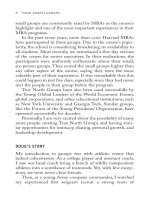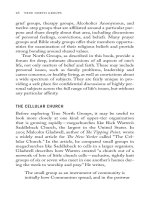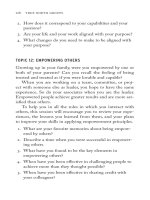True North Groups A Powerful Path to Personal and Leadership Development BK Business_8 potx
Bạn đang xem bản rút gọn của tài liệu. Xem và tải ngay bản đầy đủ của tài liệu tại đây (150.37 KB, 20 trang )
. How does it correspond to your capabilities and your
passions?
. Are your life and your work aligned with your purpose?
. What changes do you need to make to be aligned with
your purpose?
TOPIC 12: EMPOWERING OTHERS
Growing up in your family, were you empowered by one or
both of your parents? Can you recall the feeling of being
trusted and treated as if you were lovable and capable?
When you are working on a team, committee, or proj-
ect with someone else as leader, you hope to have the same
experience. So do your associates when you are the leader.
Empowered people achieve greater results and are more sat-
isfi ed than others.
To help you in all the roles in which you interact with
others, this session will encourage you to review your expe-
riences, the lessons you learned from them, and your plans
to improve your skills in applying empowerment principles.
. What are your favorite memories about being empow-
ered by others?
. Describe a time when you were successful in empower-
ing others.
. What have you found to be the key elements in
empowering others?
. When have you been eff ective in challenging people to
achieve more than they thought possible?
. When have you been eff ective in sharing credit with
your colleagues?
FEEDBACK SESSION
After completing this start-up curriculum, it is important
to plan an entire session in which each group member can
give and receive feedback from other group members. See
Resource for ground rules for feedback sessions.
FUTURE DISCUSSIONS
Participants should have an open discussion about the kinds
of topics they would like to discuss in future programs.
Resource provides a list of ideas and topics that have
worked well for other groups.
RESOURCE 2
Additional Program Ideas
when it is your turn to facilitate your group,
you have both the challenge and the opportunity to choose
a topic for the group to discuss. Life presents an enormous
portfolio of possibilities. Ensure that the topics you choose
are in keeping with the practice of having members recount
their experiences and behaviors rather than their opinions.
Keep conversations in touch with the heart and the soul, not
just the intellect.
The following topics have been successfully used by True
North Groups and other groups.
PERSONAL EXPERIENCES
1. Money in your life: What role does money play in your life?
How does your family handle discussions about money?
2. Seeing possibilities: When in your life have you “lit a candle
rather than cursed the darkness”?
3. Early experiences: What preteen experiences were most impor-
tant in shaping you?
4. Discrimination: When have you been discriminated against?
How did that make you feel? Think of a time when you have
discriminated against others. What were you feeling?
5. Mystical experiences: Have you ever had a mystical experi-
ence? What was it like?
PERSONAL BELIEFS
1. Living a full life: What does it mean to you to live a full life?
2. Life’s essential questions: What are the most important ques-
tions facing you at this point?
3. Prejudices: What prejudices did you inherit from your fam-
ily? How active are these in your life today? What new ones
have you developed since you left your childhood home?
4. Meaning: In which sources in your life do you fi nd meaning?
5. Risk taking: What risks do you wish you had taken in your
life? In which areas of your life do you tend to take risks and
where do you avoid them?
6. Fulfi llment: What gives you fulfi llment? How can you fi nd
more of this?
7. Passion: What issues are you passionate about today? Which
ones are you no longer passionate about?
8. Life’s mysteries: What are the mysteries for you in this life?
9. Heroes: Who are your heroes and why?
10. Personal creed: What is your personal creed
—
those truths
and beliefs that guide who you are and what you try to be?
How has this changed over the years, if at all? How does
your personal creed give guidance and direction to your life?
11. Death: What are your feelings about your death? Are you
prepared for it?
12. Making assumptions: What are your deepest assumptions
about your family? Your colleagues? Your boss? Your com-
petitors? People in general? Foreigners?
PERSONAL LEARNING
1. Courage: What role does courage play in your life now? Who
taught you about courage? When have you been courageous?
When do you wish you had been more courageous?
2. Staying grounded: What practices do you have in your life
that help you stay grounded?
3. Pleasure and satisfaction: What are you most pleased about in
your life so far?
4. Surprises: What have been the major surprises in your life?
About yourself? About others? About the world? About life?
5. Anger: How often do you get angry? How does your anger
manifest itself? What triggers your anger? How important
is anger in your life today? Is it stronger than in years past?
Who or what are the targets for your anger? To what degree
is anger a choice in your life?
6. Priorities: What are the top priorities in your life at this
time? Before you answer, consult your calendar, your check-
book, and your credit card purchases for the past six months.
What are the patterns that show up? How do you feel about
these? What changes would you wish to make?
7. Satisfaction: What is the greatest source of satisfaction in
your life? Why? What are the areas where you are dissatis-
fi ed with your life?
ASPIRATIONS
1. Living a full life: In which aspects do you feel your life is most
fully lived? In which is it not?
2. Following your True North: What are you like when you operate
from your True North? When are you most at peace with
yourself?
3. Desires: What do you hunger for or strongly desire at this
point in your life?
4. Accomplishments: What do you hope to achieve in your
remaining years?
5. Changing your life: In your remaining years, in what ways
would you like to be diff erent? What do you plan to do to
accomplish these changes?
6. Inner desires: What inner desires do you have that are yet to
be fulfi lled?
7. Harmony: What do you have to do to achieve the desired
sense of harmony in your life?
RESOURCE 3
The Group’s Initial Meeting
. Welcome the attendees. Have everyone introduce
themselves and share why they want to join this group.
. Review the details of the group:
How the group came together
The group’s purpose
Initial goals for the group
Proposed membership size and additional recruit-
ing required
Membership criteria and procedures to add new
people
Meeting length, frequency, location, and days and
times
Typical meeting format
Handling of any expenses
. Review the proposed member contract (see Resource).
Since this establishes explicit norms for the group, it
should be studied carefully. If everyone is in agreement,
then each person should sign the document, indicating
commitment to it. If not, then it can be fi nalized at the
next meeting.
. Decide on the leadership structure to be used, whether
the group is to be peer facilitated, professionally facil-
itated, or permanently facilitated by a group member
(see Chapter and Resource ).
. Confi rm the next meeting and hand out the initial dis-
cussion topic for the next meeting on early life experi-
ences. Some groups schedule enough time to begin this
topic at the fi rst meeting.
RESOURCE 4
Member Contract
Confi dentiality
I commit to maintaining strict confi dentiality about what
is said in all group sessions and in any discussions with
group members away from the group sessions. This includes
sharing any information or observations with nonmembers,
whether colleagues, partners, spouses, or friends.
Openness
I commit to being open in sharing highly personal matters
with members of the group, with the understanding that
everything will be held in strictest confi dence. If others are
not sharing openly with the group, it is my responsibility to
raise this with them for discussion within the group. I agree
not to push individuals beyond their comfort zone on per-
sonally sensitive matters.
Trust
I will join this group with the assumption that its members
are worthy of trust. I understand that trust is built through
honest, open communications and caring for other members
of the group.
Listening
I commit to practicing active listening and to avoid inter-
rupting the member speaking.
Judging Others
I commit to withholding judgment of group members and
will avoid giving them unsolicited advice. I will not try to
impose my values and beliefs on other members.
Feedback
As a group member, I will off er and receive constructive
feedback from others in the group on ideas, behavior, leader-
ship traits, and communication styles.
Attendance
I will make every eff ort to attend all meetings and retreats
scheduled for the group, to be on time, and to not leave early
unless there are extenuating circumstances.
Member’s signature: __________________________ Date:_______
(Note: This contract should be reviewed and updated
annually.)
RESOURCE 5
Meeting Formats
TYPICAL MEETING AGENDA
. At the appointed hour, the facilitator invites the group
to begin the meeting. If some members are late, it is an
important norm to begin the session on time.
. If there is a norm to have an opening ritual, like a
prayer, poem, or reading, it should be used to open the
meeting.
. The facilitator asks the group if anyone has an impor-
tant issue or experience they want to share at the out-
set. If so, this should take precedence and should be
discussed to a reasonable point of conclusion. However,
this part of the meeting should not be allowed to drift
into discussing current events or social issues.
. The facilitator begins the discussion by framing the
topic for the meeting and asking the opening question.
The facilitator continues the session along this line.
. If the group uses a closing ritual, the facilitator will
bring the discussion to an end prior to the closing time
and move to the closing ritual.
. Before the group separates, the facilitator should
remind the group of the next meeting date, time, and
location, especially if there are any changes pending.
This is also the time for members to announce if they
will be missing the next meeting.
OPENING RITUALS
. Your group may or may not choose to open its meet-
ings with an opening ritual. This tradition can help set
the proper framework and mood for the group’s meet-
ing and also serves as a more formal reminder that the
meeting has begun.
. If your group does not choose to have an opening ritual,
you may move directly into the meeting program.
. In its early meetings, your group may want to experi-
ment with a number of diff erent openings before select-
ing one. Some groups leave that choice to the facilitator
of a particular meeting. Others use several rituals that
are rotated over time. Some suggested opening rituals
include:
A period of silence or meditation for a period of
one to three minutes
A prayer, either the same one every week or one
off ered by the facilitator
A poem or a short story chosen to illustrate the
topic of the day
Each member gives a one-word description of
where they are in their lives that day
CLOSING RITUALS
. Gather in a standing circle to remember friends or rel-
atives who are going through diffi culties and to off er
needed support for individuals in the group.
. Members have a standing prayer or saying they use to
close the meeting.
. The facilitator off ers a poem or reading to conclude the
meeting.
. Members off er a word or a thought to capture what
they are taking away from that particular meeting.
. If the group meets monthly or less, there can be a two-
to three-minute check-in by each member. This is
recommended for the close of the meeting because
other wise this can expand to take over half of the
meeting.
RESOURCE 6
Ground Rules for Group Discussions
for your true north group to engage in mean-
ingful, personal, and intimate discussions, it is especially
important to establish ground rules for group discussions.
The goal for your group is to engage in honest conversations.
When you tell your group about a situation or event
in your life, you deserve to be listened to receptively and
respectfully. You want others to try to understand what is
happening and to help you clarify the situation. You are not
looking for judgments, arguments, advice, or fi xes at that
moment. You expect others to listen with their hearts and
not try to change you or the situation.
Nor do you want to be cross-examined or ganged up upon.
Sometimes you prefer to have some quiet time between each
person who speaks, so you can digest what you have just
heard. You don’t want to be chastised. You are not looking
for a debate or for someone to point out how you might have
avoided a painful situation. Sometimes you just want your
friends to surround you with their care.
Isn’t this exactly what other people want and need from
you when they share something deeply personal to them?
This is a good example to guide you in your actions and
responses in your True North Group. How you listen within
your group is as important as what you say. Ask honest,
open-ended questions to learn more and to clarify the mat-
ter, rather than trying to lead the person toward your way
of thinking. Don’t try to fi x, save, or blame the speaker. You
and your colleagues are there to help another person become
clearer about their situation with your active and supportive
listening, not to solve all their problems.
A useful assumption to make is that people can eventu-
ally reach a resolution to their situation with the assistance
of gentle, supportive listening and open-ended and clarify-
ing questions.
Here are some suggestions for how a meaningful group
discussion works:
. Everyone is talking on-point.
. They are building on the comments of other group
members.
. All are sharing openly and personally.
. People are actively listening to others.
. Members share their feelings honestly.
. People disagree respectfully.
. Facilitators bring the discussion back to the topic if it
begins to wander.
. No one is dominating the discussion.
. The facilitator ensures adherence to the group norms.
If the discussions in your True North Group follow these
guidelines, you will enjoy the benefi ts of having honest
conversations.
RESOURCE 7
Guide for Facilitating Groups
sound facilitation of your true north group is
an essential element of its eff ectiveness and its ability to
engage in honest conversations that are useful for all its
members.
First, your group should decide on the leadership model
you intend to use. The three models described in the chap-
ter on forming were peer facilitators, professional facilitators,
and group member as permanent facilitator. This resource
provides a complete guide to facilitating groups as a peer and
to fi nding a professional facilitator.
MEMBER-LED GROUPS WITH PEER FACILITATORS
One of the most important skills every group member should
have in a peer-led group is the ability to facilitate eff ectively.
Whatever your life role, at some point you will be called
upon to facilitate a group. Many people have had experience
in facilitating and leading task-oriented groups, but facilitat-
ing a True North Group is considerably diff erent from lead-
ing a task team.
In your True North Group, the emphasis is on the per-
sonal, not on accomplishing a task or having intellectual dis-
cussions. In these groups you will be addressing personal
topics, and the task is to know yourself better, to enable other
group members to understand themselves, and to build trust
and bonding within the group.
Facilitating a group of this type requires a level of skill
to draw out personal experiences and ensure that insights
and refl ections are drawn from all participants. The facilita-
tor must establish an atmosphere of trust and openness that
enables group members to share openly.
It is important to emphasize that True North Groups
are not therapy groups or s T-groups. Facilitators are
not asked to act as a psychologist or therapist. It is impera-
tive that a safe atmosphere exists at all times. That said, it is
equally important that all group members feel they are get-
ting their fair share of airtime, without one or more mem-
bers dominating the group. Nor is it acceptable if individuals
refrain from full participation in the group or withdraw dur-
ing the sharing process.
YOUR ROLE AS FACILITATOR
When you lead a True North Group session, you are help-
ing to build the community of which you are now a member.
Important life change happens within the bounds of inten-
tional growth relationships such as these. Your role as facil-
itator may be diff erent from any you have had before. Your
goal is to encourage all group members to open up and share
personal stories, beliefs, and principles. To facilitate a fruitful
discussion, you should encourage people to speak from their
hearts, not their heads.
To facilitate means “to make easier.” As a facilitator, your
job is to make the conversation among your colleagues
freer and more satisfying. Ensure the atmosphere is relaxed,
safe, noncompetitive, and conducive to sharing. Usually,
this means beginning the discussion by asking the open-
ing question and then withholding your input until others
have spoken. You guide the discussion to ensure all have the
opportunity to speak and that no one dominates.
In this role you are neither the teacher nor the expert or
scorekeeper. Your role is to listen carefully to what is said, to
help guide the discussion so that everyone is heard, to ensure
that no one dominates, and to enable group members to
share diff ering opinions in a respectful manner.
Tight control is the enemy of open sharing. Pushing hard
to accomplish fi xed goals you have for the session can keep
you from creating an open dialogue. Still, you have things to
accomplish and a timetable to maintain. Your job requires that
your group achieve a balance between task accomplishment
and a collegial, open climate that builds trust. This won’t be
as formless or free-fl owing as a social gathering of your group
nor as structured as a task team with measurable outcomes.
CHOOSING DISCUSSION TOPICS
During your group’s fi rst year, it is important to use the start-
up curriculum. Begin by carefully going over the topics and
instructions presented in Resource . Then refer to the corre-
sponding chapter in True North to get some deeper insights
about the topic. You may want to assign this chapter as read-
ing for your members. You will also fi nd some proven exer-
cises aligned with this topic in Finding Your True North: A
Personal Guide.
After the fi rst year, you can get ideas for additional pro-
grams by studying the list presented in Resource and
choosing a topic. Or you may come up with a topic of your
own. Then develop a key question that you will use to initi-
ate the discussion, followed by other questions you want the
group to address. These should be open-ended questions that
cannot be answered with yes or no. We suggest that ques-
tions start with the words who, what, why, where, when, or how.
It is helpful to share in advance with members the ques-
tions to be addressed. If you plan to use a reading, it is a good
idea to e-mail it to group members so you do not have to
use discussion time for everyone to read it. You should arrive
early to ensure the room is organized the way you want it in
order to promote sharing.
Always start with a welcome that makes everyone feel
comfortable about being in the group. Follow this with any
introductory comments and announcements.
As facilitator, you may want to off er the opportunity at
the outset for group members to check in by taking a minute
or two to share with the other members anything signifi cant
in their lives since the last meeting, or members might speak
about what they are feeling at that moment. Such time can
build trust, especially in early meetings. Due to time con-
straints, however, this part of the discussion should not be
allowed to drag on unless the issues raised are extremely seri-
ous. If the group likes to chat too much, it will detract from
the group discussion. Alternatively, you can reserve this part
of the discussion for the end.
As facilitator, it is your responsibility to keep the group on
task in a pleasant, effi cient manner, making sure everyone has
the opportunity to participate and no one dominates the dis-
cussion. Your goal is to have a discussion with full participa-
tion that results in honest conversation.
A worthwhile and satisfying discussion about highly per-
sonal topics hinges on the chemistry of the group and the
mood of the meeting. Usually, you will not be in a crisis mode,
so it should be fairly easy to keep the mood relaxed, open,
friendly, and comfortable for all group members. Appropriate
humor from time to time can help set the tone and can break
the ice if the discussion is getting too tense or emotional.
To begin the substance of the discussion, pose the open-
ended question that each member should answer and let
whoever is prepared to speak go fi rst. Alternatively, you can
volunteer to go fi rst, serving as a role model in answering
the question in an open manner. It is recommended that you
give each person an allotted amount of time to respond to
the opening question, and let everyone share their responses
before you open up the discussion to a broader dialogue.
Otherwise, you may run out of time for everyone to respond.
In this kind of round-robin, listening skills are very
important. It is sometimes hard to keep an open mind dur-
ing the discussions, as members may want to evaluate and
respond to the speaker. Your job is to listen actively to each
person and, if necessary, lead the discussion in the appropri-
ate direction. You should encourage response or support for
each speaker before moving on. Make the discussion lively by
keeping the group moving and engaged in the topic.
THINGS TO WATCH FOR DURING THE MEETING
1. Keeping your group on track. In select instances, you may have
to act like a timekeeper to keep the discussion fl owing. There
will be times when you have to gently interrupt a domina-
tor by asking a quiet member of your group to respond. In
other cases, you may have to guide the discussion back to the
central point. There will be times when you have to move to
another topic or person in spite of some who want to con-
tinue with the current discussion. There will be cases when
the group will seem to lose interest in a topic and you must
shift prematurely to another subject to keep the momentum
of the discussion lively and fresh.
2. Balancing group participation. You will have to pay close atten-
tion to what is being said and not said. What are the non-
verbal signals being sent in addition to those vocally shared?
This is a skill that takes time to develop and sharpen. Is the
quality of the discussion superfi cial or deep? How much are
you talking? How involved are the other members? Be sure
that everyone gets adequate airtime and doesn’t just pull back
into themselves.









